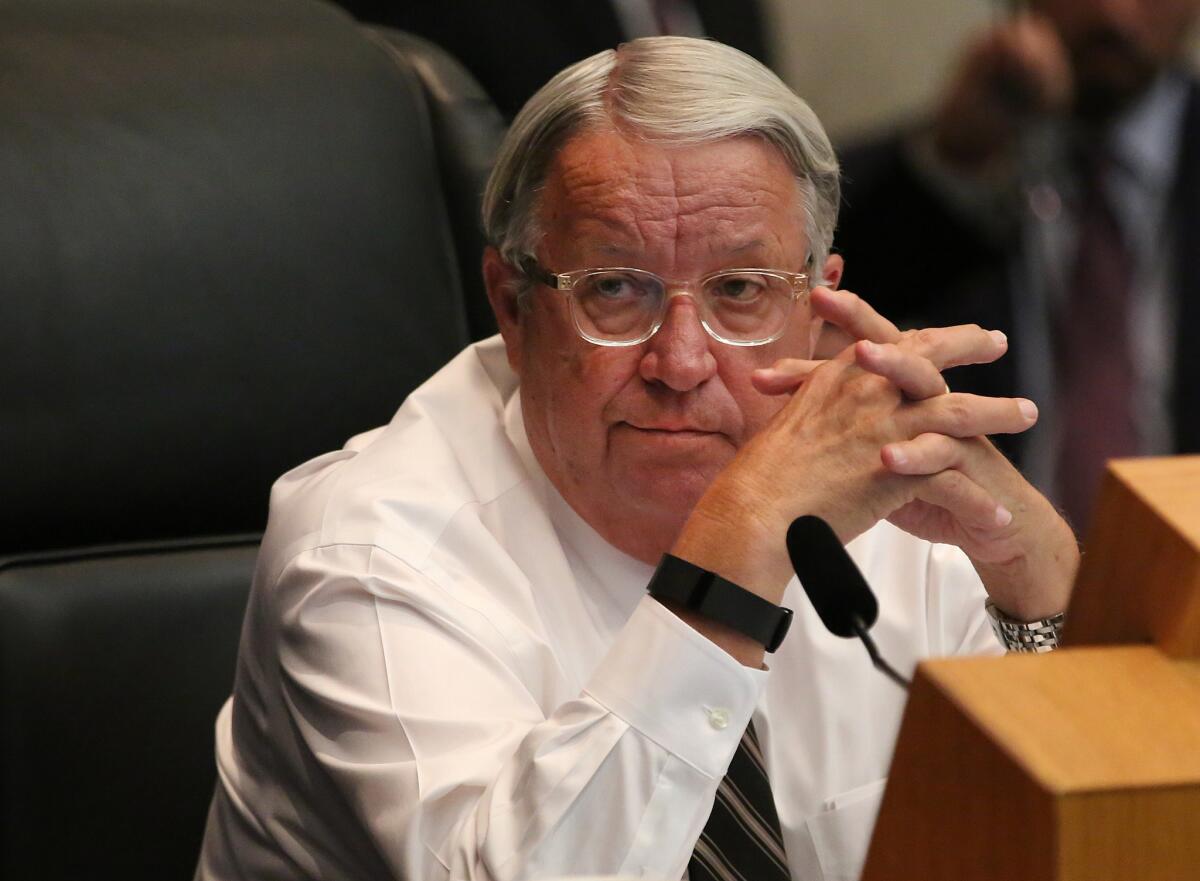Vacation payout for county supervisor becomes issue in fight over ouster of attorney

In November 2014, Los Angeles County Counsel Mark Saladino signed off on a memo giving the go-ahead for Supervisor Don Knabe to collect more than $100,000 in vacation pay when he retires at the end of this year.
Seven months later, the other supervisors consulted a second attorney who concluded that Knabe was not entitled to the payout.
Within days, Saladino abruptly resigned from the top attorney position and moved to a lower-ranking position in the office of treasurer and tax collector, which he had headed up before being appointed county counsel in 2014.
The vacation pay memo is part of a political drama unfolding at the county Hall of Administration that includes two lawsuits filed by Saladino against his former clients, the county and the Board of Supervisors.
In a complaint filed earlier this month Saladino â who was approved for disability retirement after several months of disability-related stress leave â said he was forced to step down because he had attempted to prevent misconduct by the board.
He alleged in his lawsuit that Supervisor Mark Ridley-Thomas, in particular, had engineered the ouster in part because Saladino was close to former county chief executive William T Fujioka, a political enemy of Ridley-Thomasâ, and because Saladino had refused to steer contracts to Ridley-Thomasâ friends.
Fujioka was the author of the November 2014 memo that concluded Knabe was eligible for the so-called âleaving vacationâ pay of up to 25 weeks of salary.
In an interview, Fujioka said he initiated the review of the vacation pay policy and did the analysis, and that he stands by the memoâs findings. Fujioka said he believes that Saladino was ousted for political reasons unrelated to the vacation pay.
âI feel the action was an example of gross retaliation on the part of Ridley-Thomas,â he said.
Knabe did not respond to requests for comment. Ridley-Thomas declined to comment.
The current county counsel, Mary Wickham, said in a statement, âFujioka has a self-serving interest to assert that the analysis was supported since he was the author of the memo. The legal analysis provided by Mr. Saladino was contrary to the plain language of the code as confirmed by independent outside counsel. The board made a decision, as any client can, to change counsel and there is no merit to the claim of retaliation.â
In 1994, the Board of Supervisors changed rules governing vacation payouts for top officials so that supervisors and department heads would not longer receive the âleaving vacationâ payments. But they left an exemption for those who were appointed or elected to office before July 19, 1994.
That loophole meant that supervisors Zev Yaroslavsky and Gloria Molina, who retired due to term limits in 2014, each received the maximum 25-week payout, totaling $144,182.75, according to county Auditor-Controller John Naimo. Supervisor Michael D. Antonovich will also be eligible to take the payment when he retired at the end of this year.
Knabe was elected to office in 1996, after the cutoff date, but Fujioka wrote that because Knabe had worked prior to that as a top aide to his predecessor, Dean Dana, he should be considered eligible for the payment.
He added that the date restriction on the vacation payout âcauses unequal and inconsistent treatment in light of how other county supervisors, serving concurrently with Supervisor Don Knabe since 1996, are eligible to the leaving vacation benefit.â He directed the county auditor-controller to make the payment when Knabe leaves county office. Saladino signed off to the memo.
Saladinoâs attorney, Kenneth F. Spencer, said Saladino had merely approved the memo âas to form,â indicating that he thought Fujioka had the authority to decide the issue. Neither Saladino, Fujioka, nor auditor-controller Naimo â to whom the memo was addressed â shared the document with the rest of the board, he said.
Spencer said Saladino did not report the memo to the other supervisors because it was the chief executiveâs memo and Saladino âassumed that Mr. Fujioka reported it to the board or to whomever he felt should have known about the memo.â
Fujioka said he did not remember who the memo had been shared with or whether it had been sent to the board offices.
Naimo declined to comment on the memo.
Shortly thereafter, Fujioka retired and the makeup of the Board of Supervisors shifted, with Yaroslavsky and Molina being replaced by Hilda Solis and Sheila Kuehl.
After Fujioka retired, Spencer said, âthe memo surfaced and the board was angered that Mr. Saladino did not report the memo to them at the time it was written and that he signed off on the memo.â
A few months later, the new board commissioned a private attorney to do a new analysis of the vacation pay question.
A second memo from the boardâs executive officer to the auditor-controller, dated June 9, 2015, noted that the second attorney, Louis âSkipâ Miller and his firm âhave concluded that the November 21 memorandum is incorrect. The Board of Supervisors has agreed.â It directed that Knabe should not receive the vacation payout.
Saladino alleged in his complaint that at the same June 9 closed-door meeting where the supervisors â minus Knabe â discussed the vacation pay question, they decided to remove Saladino as county counsel.
âMr. Saladino believes that Supervisor Don Knabe was wrongfully excluded from the closed session because he may have voiced opposition to Mr. Saladinoâs termination or supported Mr. Saladinoâs analysis of a memo drafted by the CEO regarding the accrued vacation time of Supervisor Knabe,â the complaint said.
County officials declined to provide the memo, citing attorney-client privilege, but The Times later obtained a copy of it.
Twitter: @sewella
More to Read
Sign up for Essential California
The most important California stories and recommendations in your inbox every morning.
You may occasionally receive promotional content from the Los Angeles Times.










